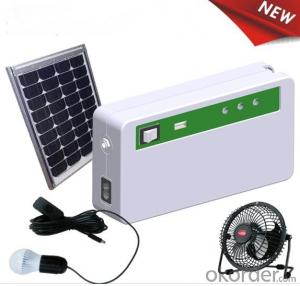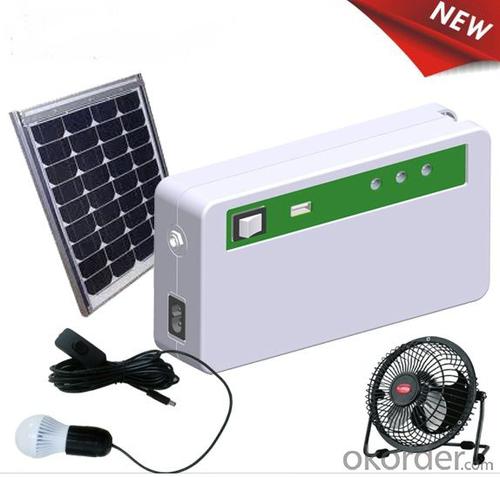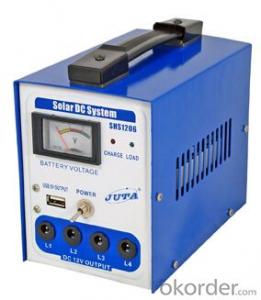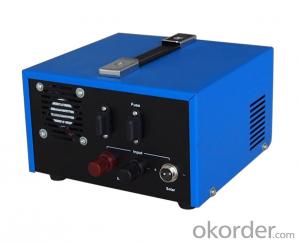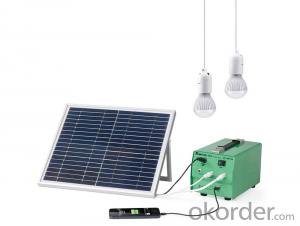Adithya Solar Energy Systems - New Energy Solar Storage System with 3pcs 12v DC LED Bulb
- Loading Port:
- Shanghai
- Payment Terms:
- TT or LC
- Min Order Qty:
- 300 watt
- Supply Capability:
- 200000 watt/month
OKorder Service Pledge
Quality Product, Order Online Tracking, Timely Delivery
OKorder Financial Service
Credit Rating, Credit Services, Credit Purchasing
You Might Also Like
| Packaging & Delivery | |
| Packaging Detail: | wooden cartons and pallets with foam filling for solar storage system |
| Delivery Detail: | 5-7weeks |
| Specifications | |
| solar storage system | |
| LiFePO4 battery | |
| Unique design controller box | |
| High bright solar light | |
| Over load& charge protection | |
| 2,Specification for solar storage system | ||||
| Solar panel input parameter | rated input panel(WATT) | 8w | ||
| efficient | 15% | |||
| material | monrocrystal/polycrystal | |||
| Battery | voltage | 12.8v | ||
| capacity | 5AH | |||
| NO. | 4pcs 32650 | |||
| Deployed DC Load for lamp | 1w | NO. | 2pcs | |
| Lum | 90 | |||
| 2w | NO. | 2pcs(one USB lamp) | ||
| Lum | 200 | |||
| Deployed lamp cable | 5m | |||
| USB output | 5V 1A | 1output | ||
| system efficient | 95% | |||
| protection | over load/over voltage/low battery/low voltage/input low/high voltage/short current protection | |||
| load | 2pcs 2w | 2pcs 3w | 1pcs 3w+2pcs 2w | 4pcs 2w |
| (2 rooms) | (2 rooms) | (3 rooms) | (4 rooms) | |
| operated time | 12 hrs | 8hrs | 10 hrs | 6 hrs |
| system including the following parts: |
| 1PC 8W/18V solar panel with 5m cable |
| 1PC 5AH/12.8V lifepo4 battery |
| 1PC controller/Battery box |
| 3PCS 2W/3W solar DC LED lights |
| 3PCS Lamp holder and switch with 5m cable |
| 1PC Multi port USB cable for mobile charging |
| 1PC User manual |
| Caution for solar storage system |
| Please read the user manual carefully before using, the incorrect operation will damage the product |
| Protect the product from drastic crash or throw |
| Keep the controller box away from water or fire |
| Do not disassemble the controller box or other components |
| Do not drag the cable of the solar panel strongly, or it will come to poor contact |
| Keep it away from children |
| Packaging & Shipping | |
| Packing | color giftbox with polyfoam and bubble bag |
| Inner packing | 1pc / giftbox |
| Outer packing | 8pcs / carton |
| Carton size | 612*468*360mm |
| G.W. | 25kg |
- Q: How do solar energy systems impact utility bills?
- Solar energy systems can have a significant impact on utility bills by reducing or even eliminating the need for traditional energy sources. By harnessing the power of the sun, these systems generate electricity that can be used to power homes and businesses. This can result in substantial savings on monthly utility bills as less energy is consumed from the grid. In some cases, excess energy generated by solar panels can even be sold back to the utility company, further reducing costs. Overall, solar energy systems can help reduce reliance on fossil fuels, minimize environmental impact, and provide long-term financial benefits by lowering utility bills.
- Q: Can a solar energy system be integrated with an existing electrical system?
- Yes, a solar energy system can be integrated with an existing electrical system. It involves installing solar panels, an inverter, and a net metering system that allows the solar-generated electricity to be used alongside the existing electrical grid. This integration can help reduce reliance on traditional grid power and provide clean, renewable energy for the building.
- Q: Can solar energy systems be used for heating swimming pools?
- Yes, solar energy systems can be used for heating swimming pools. Solar pool heating systems use energy from the sun to heat the water in the pool, reducing the need for conventional heating methods and saving energy costs.
- Q: Can solar energy systems be used for powering off-grid eco-farms?
- Yes, solar energy systems can be effectively used for powering off-grid eco-farms. Solar panels can be installed on eco-farm buildings or in open areas to harness the sun's energy and convert it into electricity. This clean and renewable source of energy can then power various aspects of the eco-farm, including irrigation systems, lighting, heating, cooling, and other electrical needs. By utilizing solar power, these off-grid eco-farms can reduce their reliance on non-renewable energy sources and minimize their carbon footprint, contributing to a more sustainable and environmentally friendly farming operation.
- Q: Can solar energy systems generate power at night?
- No, solar energy systems cannot generate power at night because they rely on sunlight to generate electricity.
- Q: Can solar energy systems be used in powering wineries or breweries?
- Yes, solar energy systems can be used to power wineries or breweries. Solar panels can be installed on the roofs of the buildings or in nearby open areas to generate clean and renewable electricity. This can help wineries and breweries reduce their dependence on fossil fuels, lower their energy costs, and contribute to a more sustainable and environmentally-friendly operation.
- Q: Can a solar energy system be installed on a building with a flat roof?
- Yes, a solar energy system can be installed on a building with a flat roof. Flat roofs provide an ideal surface for mounting solar panels, as they offer a level surface and provide ample space for installation. Furthermore, flat roofs often have unobstructed sun exposure, which is crucial for maximizing the efficiency of solar panels.
- Q: How does the efficiency of solar panels vary across different installation locations?
- The efficiency of solar panels varies across different installation locations due to various factors such as the amount of sunlight received, the angle and orientation of the panels, shading, temperature, and local weather conditions.
- Q: Can solar energy systems be used for powering electric boats or ships?
- Yes, solar energy systems can be used to power electric boats or ships. Solar panels can be installed on the surface of the boat or ship to capture sunlight and convert it into electricity. This renewable energy source can provide a sustainable and clean power solution for propulsion and other electrical needs on board. However, the effectiveness of solar energy for powering boats or ships may vary depending on the size of the vessel and the availability of sunlight.
- Q: Are there any risks of electrical shock with solar energy systems?
- Yes, there are potential risks of electrical shock associated with solar energy systems. While solar energy systems are generally considered safe, the presence of high voltages and electrical currents within these systems can pose a risk if not properly managed or handled. Some of the key risks include: 1. Installation and maintenance: During the installation and maintenance of solar panels, there is a risk of coming into contact with live electrical components. This can occur if proper safety procedures are not followed, or if individuals without proper training attempt to handle electrical connections. 2. Faulty equipment or wiring: Malfunctioning or faulty equipment, such as inverters or wiring, can increase the risk of electrical shock. Poor installation practices or inadequate maintenance can also lead to electrical faults, which may expose individuals to dangerous electrical currents. 3. Fire hazards: Although not directly related to electrical shock, faulty electrical components or wiring can increase the risk of fire in solar energy systems. Fires can further exacerbate the risk of electrical shock if individuals attempt to extinguish them without shutting down the electrical system first. To mitigate these risks, it is crucial to follow proper installation and maintenance procedures, which often include working with a licensed professional. Additionally, individuals working with solar energy systems should be trained on proper safety protocols, such as wearing appropriate personal protective equipment and ensuring electrical systems are properly grounded. It is also important to regularly inspect and maintain solar energy systems to identify and address any potential electrical hazards.
Send your message to us
Adithya Solar Energy Systems - New Energy Solar Storage System with 3pcs 12v DC LED Bulb
- Loading Port:
- Shanghai
- Payment Terms:
- TT or LC
- Min Order Qty:
- 300 watt
- Supply Capability:
- 200000 watt/month
OKorder Service Pledge
Quality Product, Order Online Tracking, Timely Delivery
OKorder Financial Service
Credit Rating, Credit Services, Credit Purchasing
Similar products
Hot products
Hot Searches
Related keywords
